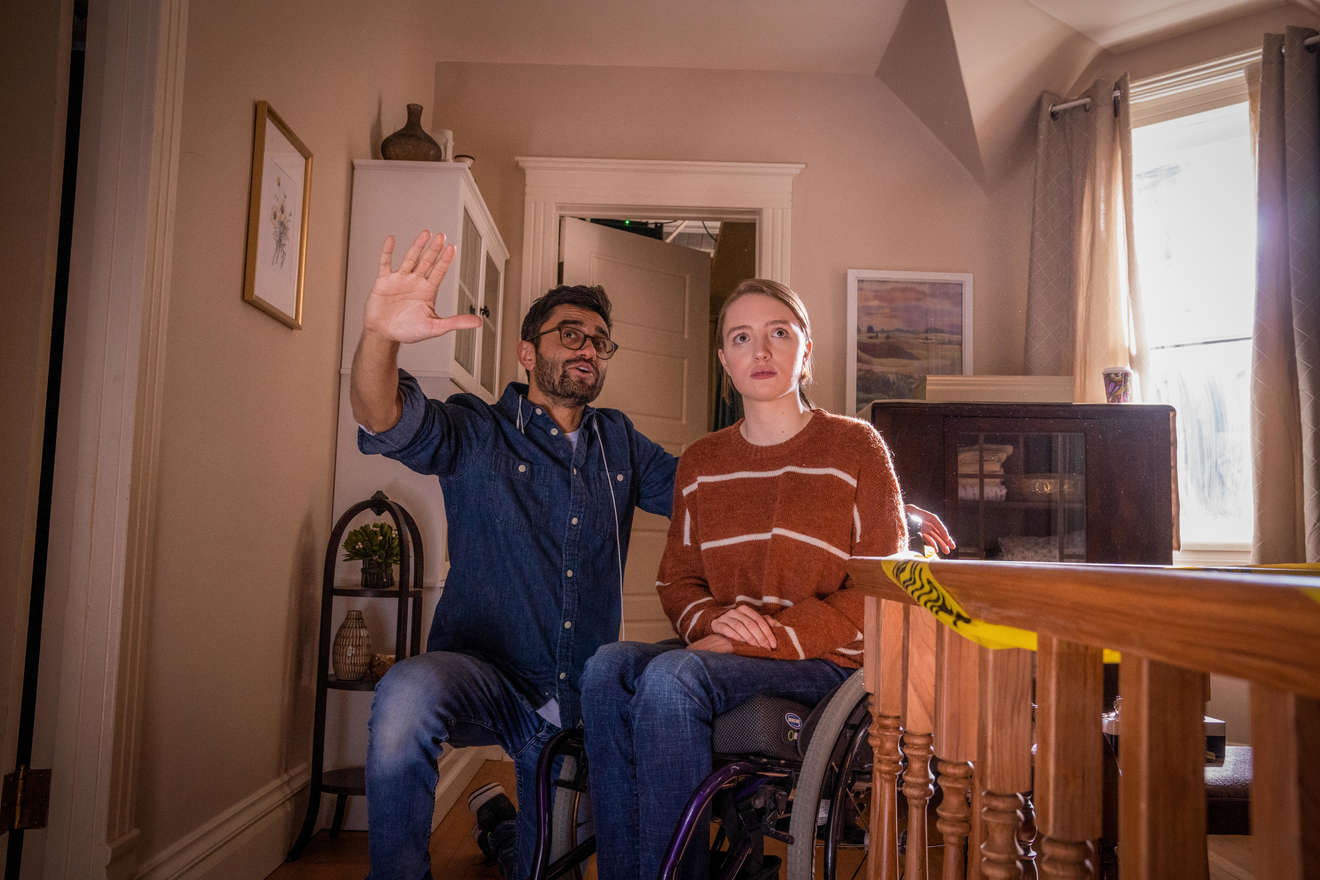
14 Dec Disability In Film: The 5 Most Important Portrayals of the Disabled Experience in 2020
BY DIEGO ANDALUZ
Despite the storm of negativity that has been the past twelve months, both within the film industry and outside of it, one of the few positive aspects of our current circumstances has been seeing various facets of cinema blossom that had previously been relegated to the shadows. The representation of marginalized groups in entertainment has always been a tough struggle, and the disabled community has historically been left behind. Yet, this year, films depicting accurate portrayals of the disabled experience are finally getting their time to shine. Whether it be through studio releases, festival darlings, international pictures, or streaming hits, 2020 has been one of the greatest years for the mainstream exposure of disabled representation in recent memory. It’s clear that much more still has to be done to get the industry to a point where the community feels justly represented, but these five films represent the giant leap forward that 2020 made for the disabled community in media that will hopefully kick off a long awaited movement to make things right for the community in the industry as a whole.
In line with Disability History Month, you can find a special discussion surrounding all of these themes and films on the Disability In Film episode of The Global Film Podcast. Featuring a roundtable comprised of critics who are members of the disabled community from Variety, Indiewire, and more, as well as special appearances from Run co-writer and director Aneesh Chaganty and co-producer Natalie Qasabian, the episode includes discussions about Run, Sound of Metal, and other films that are important to the future of disabled representation.

RUN
Directed by Aneesh Chaganty
Where to Watch: Hulu (US); awaiting a global theatrical release.
Starring Sarah Paulson, as well as Kiera Allen in her debut role, Run is writer-director Aneesh Chaganty and co-writer Sev Ohanian’s second feature length film, after the remarkable independent success of their 2018 debut Searching. Following the story of the relationship between Chloe, a wheelchair user and high school senior who is getting ready to head to college, and Diane, an overprotective mother with a dark secret, the film premiered on Hulu last month and shattered records and received largely positive reviews.
Yet, while its tense atmosphere and tight screenplay deserve much of the praise, its incorporation of a lead actress who is a member of the disabled community is what truly made the film stand out. Instead of going the typical industry route and casting a big name who would’ve delivered an inauthentic portrayal, Chaganty and producers Ohanian and Natalie Qasabian made sure to cast someone who had lived through the experiences of the main character. In addition to allowing space for a brilliantly authentic portrayal from Kiera Allen, the filmmakers’ decision to consult with both her and a disability studies professor from Brown University on the screenplay allowed for the modification of character arcs and other details, ensuring that Run could stake its claim as one of the first major studio films to take commendable leaps for the representation of an often forgotten community in mainstream media.
PENGUIN BLOOM
Directed by Glendyn Ivin
Where to Watch: Netflix (US) (Available on January 21st, 2021)
Australian director Glendyn Ivin’s newest film Penguin Bloom tells the true story of Sam Bloom (Naomi Watts) who suffers a tragic accident during a vacation that leaves her unable to walk, and wheelchair bound. As she and her family grapple with their new circumstances, she is met with an unusual visitor: a magpie who cannot fly.
While the hardships that Sam Bloom faces are understandable, a theme of ableism is present in the many interactions Sam has with those around her. At some points, Sam expresses that she feels like a worthless burden who cannot properly explore the extent of her life purpose. Statements like these, when taken out of context, could come off as a narrow-minded effort from the creative team. However, as the film begins to wind down, we are shown that her inner conflict with the loss of her ability to walk is in fact one of the central emotional beats of the film and that Sam’s intentions are brought full circle. When she learns to accept herself and her condition, shedding her ableist mindset, she is finally able to find happiness within her being. While these themes and morals could have been expressed in clearer ways, overall, the film resists the temptation to keep that aspect one-dimensional and instead fleshes it out into a full narrative arc, resulting in a well-made and worthy film.
You can find the author’s full review of the film from the Toronto International Film Festival here.
SOUND OF METAL
Directed by Darius Marder
Where to Watch: Amazon Prime Video
A film that first premiered more than a year ago at the Toronto International Film Festival, Sound of Metal launched to audiences around the globe on Amazon Prime Video on December 4th. Directed by Derek Cianfrance’s protege Darius Marder and starring Riz Ahmed in a transformative performance, the film tells the story of a passionate drummer who must come to terms with his gradual loss of the sense that matters to him the most: hearing. In this fiery but methodical film, all the risks taken pay off and result in a brilliant technical exploration of this audiovisual medium and a shocking performance from Riz Ahmed, resulting in glowing reviews, with the critical and audience consensus even putting it above films being released from big names on that same weekend.
In terms of disabled representation, this film takes a different—but effective— approach to the casting of members of the disabled community. Revolving around a man who had never experienced these types of hardships before but must immerse himself in the communal experiences of those like him to move forward with his life, the film positively frames disability as a trait to be accepted and cherished rather than an obstacle to be overcome. As the main character is able-bodied at first, in a Q&A with Amazon, director Darius Marder emphasized that he fought hard for the lead to be played by an able-bodied—but capable— actor (which he found in Riz Ahmed), to mimic his experience of having to adapt to his circumstances, while ensuring that the supporting actors were true members of the disabled community. This approach worked incredibly well for the film, propagating a true sense of conflict and authenticity, while even creating awards buzz for disabled actors such as Paul Raci, in what would otherwise have been a missed chance for representation.
37 SECONDS
Directed by Hikari
Where to Watch: Netflix
One of the first japanese films to be internationally recognized for its deep dive into living with a disability, 37 Seconds tells the story of Yuma. Diagnosed with cerebral palsy and emotionally stunted by her well-meaning but overly protective mother, at the age of 23, she decides to forge her own unusual path to sexual awakening and independence while at the same time discovering love and forgiveness. This film first premiered at the Berlinale in early 2019, where it got a rapturous critic and audience response, nabbing two major awards over the course of the festival, and eventually making its way to Netflix, where it has been available to watch since January 31st.
Once again, the director of this film, Hikari, made sure to incorporate an authentic perspective at the center of the film. Choosing to search for a disabled non-actress, she found someone who resonated with the ideals of the story she wanted to tell (Mei Kayama). Hikari actually molded the story around Kayama and her experiences as well as her mother’s experiences in order to tell a compelling story that wouldn’t come off as over-formulated. Regarding its portrayal of disability, this is another film that stands out from the crowd. Apart from capturing it with a unique visual style that beautifully blends reality with layers of animation and manga in her daily life, the film also explores the facet of the disabled communities’ relationship with sexuality and expressing greater desires.
CRIP CAMP
Directed by Nicole Newnham and James Lebrecht
Where to Watch: Netflix
The only documentary on this list, Crip Camp premiered at this year’s edition of the Sundance Film Festival to much acclaim, and landed on Netflix on March 25th. Focusing on the young members of a disabled community who attended Camp Jened, the documentary tells the story of how their experiences at the titular camp changed many of their ways of thinking and led them to form a community that changed the landscape of disability rights around the world.
Taking a more realist approach than the rest of the films mentioned here due to its non-fiction narrative nature, its scale goes further beyond what one would expect from its promotional materials. The film starts at the camp, but follows the efforts of those who left the camp and attempted to make a mark on the fight to increase rights for those with disabilities. It goes past the counterculture movement, and tackles everything from identity and interpersonal hierarchies to love, passion, communal bonds, and fighting for what is right. Overall, amid the rise in disabled media this year, Crip Camp is perhaps the most raw and unfiltered film to capture the multifaceted experiences of the disabled community.

A Latinx writer with cerebral palsy, Diego Andaluz is the producer and host of The Global Film Podcast, and is currently writing for multiple publications. A filmmaker as well, he has produced, directed, edited, and shot numerous award-winning short films (including the viral horror short, Dante: A Replication) in isolation. Currently, apart from covering the awards season, Diego is writing a feature length screenplay based on his short, Dante: A Replication.

Sorry, the comment form is closed at this time.